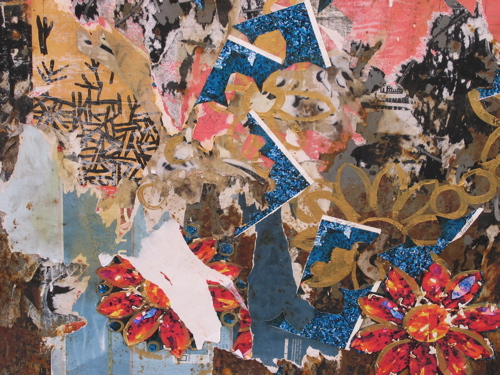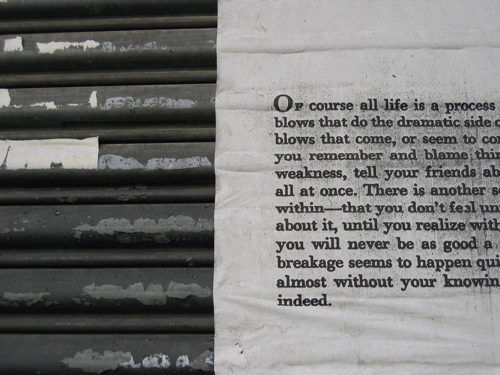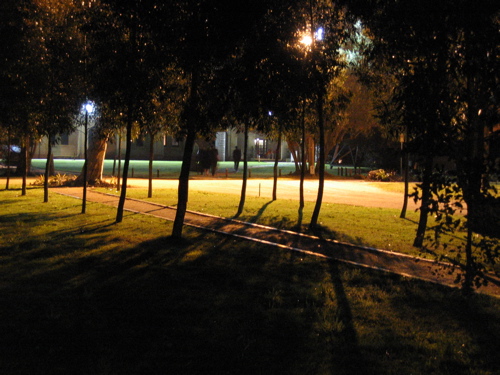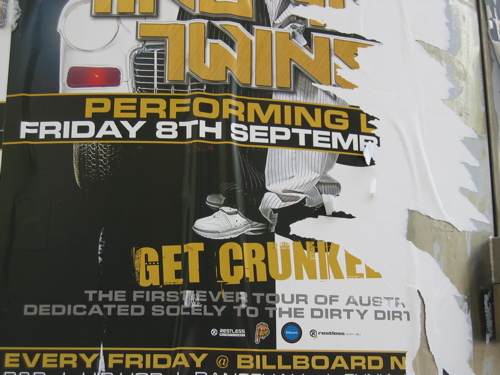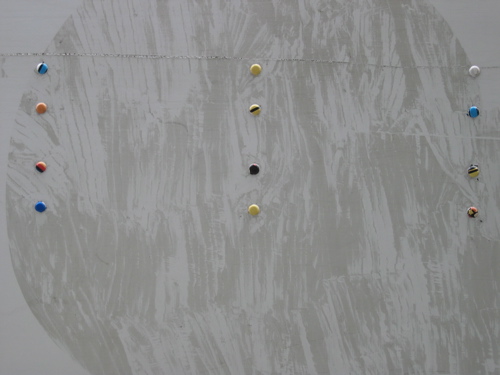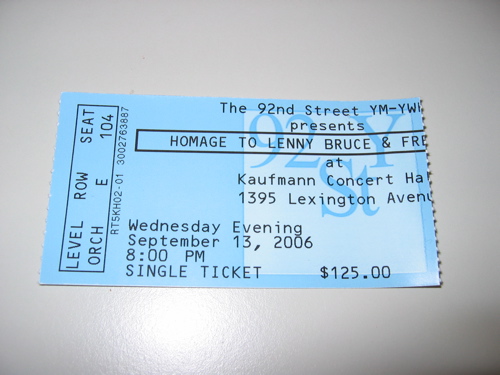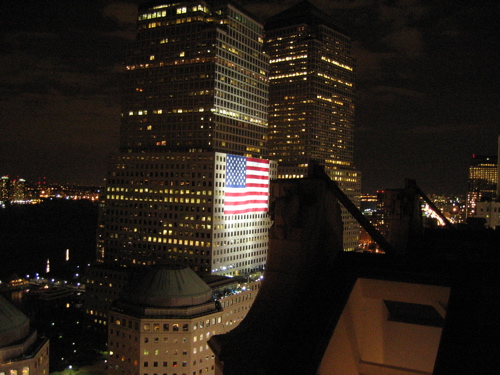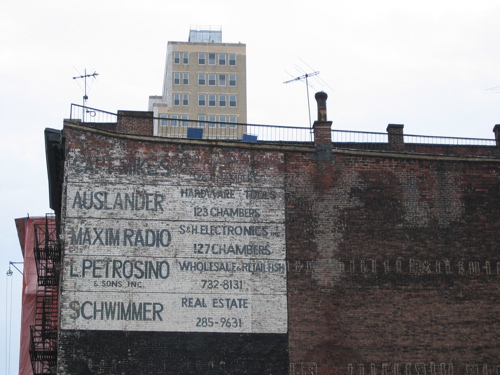September 30, 2006
ON WALKING BACKWARDS
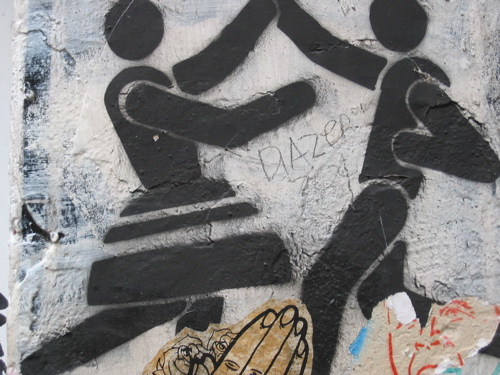
“I can look down, I can smell and if I see the shape of a leg, I can just move into the space where it is not.”
September 29, 2006
RIGHT YOUR WRONGS THIS WEEK

“I was sent to the principal’s office more times than Jack, but now he’s been sent to the principal’s office more times than I have.”
“How many times have you been sent?”
“Once. He had been sent no times, and now he’s been sent twice.”
“Why were you sent to the principal’s office?”
“Let’s not worry about that right now. Let’s focus on why Jack was sent to the principal’s office.”
INBOX/OUTBOX

The above photo was taken by regular reader Liz Clayton, who has further treats on offer here.
HOT HOT HOT

Drew at Destination: OUT just alerted us to this excellent article on CD mastering by Nick Southall. (He found the article linked on Darcy James Argue's website.)
September 28, 2006
DOS AND DOS MAS

Alex and Jane extend the circle of compression.
I have politely asked engineers to compress entire records I’ve played on; I’ve barked at engineers who were using compression when committing my signal to tape; I’ve gone giddy listening to modern pop records squashed beyond belief; I’ve wearily turned off satellite radio after three songs because there was no room for me.
Flattening and torquing the dynamic range is an effect, like every other in a field of all artificial, reproductive effects. Knowing this might lead A&R heads and their employees to decrease its usage, but I doubt we will see anything other than market splits—quiet uncompressed records here, pop records here—in the near future.
September 23, 2006
September 22, 2006
September 21, 2006
FANGING IT, LIKE A HOON
1. Melbourne is the first place I’ve visited in the last three years where goods are, if not cheaper, then at least not so crushingly expensive that it becomes impossible to enjoy the act of spending your tiny American dollars in a city you don’t know.
2. The food is surprisingly good.
3. See above for video for Lillix’s “Sweet Temptation” (the only song from “Inside The Hollow” to be released in America): Bring democracy to rock, rock bands. Let everybody sing a verse. They’re not all singers, you say? Pish to your meritocracy! And the big illuminated “1, 2, 3, 4” backdrop—has no one done this before? Vanilla Fudge? B2K? Such a move. Four members, four beats to the bar, it doesn’t hurt to be REMINDED. IN. NUMERALS. YOU. CAN. SEE. WHILE. YOU’RE. SHAVING. IN. THE. OTHER. ROOM.
September 14, 2006
September 12, 2006
THE GAP

Question, after watching Fashion Rocks, etc, and thinking about the Justina, et al albums: Who made it OK to go four years between records? Certainly not The Beatles, or Dylan or Pink Floyd. My money, and Ben’s, is on Michael: Three years between “Off The Wall” and “Thriller,” then another five years until “Bad,” and the same before “Dangerous” in 1992. Record companies like juicing an album up to five or six singles if possible, but they would rather do that AND sell another new album, as singles only make money by moving albums. “Superstition” would end up selling two or three Stevie Wonder records at once. Xtina could get over her Broadway moment and move on, but you know she won’t. She’ll mutz around with it for a year or two, “relax,” and then be off the boil next time she calls the pros. What the eff?
Matos writes in: “Maybe as much as Michael it was Bruce, though that’s kind of on a technicality: three years between ‘Born to Run’ and ‘Darkness On The Edge of Town,’ unheard of at the time and mostly due to the fact that Springsteen was caught up in lawsuits and couldn’t legally record, from what I remember. There’s also Zeppelin: three years between ‘Presence’ and ‘In Through the Out Door.’ (I think that had more to do with Robert Plant’s son dying than any planned-out thing, though.)
Keep in mind, too, that between ‘Off The Wall’ and ‘Thriller’ there was ‘Triumph’ (1980), featuring “Heartbreak Hotel” and “Can You Feel It,” both big hits. Michael wasn’t really considered a solo act until ‘Thriller’ blew the roof off the dump. Also, the live stopgap cannot be overlooked. The Jacksons did a live one in ‘81; you could count Fleetwood Mac here too, who did one in ‘80, during the gap between ‘Tusk’ (‘79) and’ Mirage’ (‘82). And hey, Zep too (‘Song Remains the Same’).”
September 11, 2006
A LITTLE GLASS JAR

Reading Jessica’s notes on T&G 25, two things popped into my mind: Big Black were, yes, very dependable on the stage b*ck in the d*y (no nostalgia), though their most entertaining show involved a Roland drum machine not working. (Summer, CB”s, 1985/6?) Their guitars were sexually violent, skullfucky, all that. A friend used to put her head right in front of the speaker when I played “L Dopa” real loud.
If Touch & Go bands were to be reduced to one moment in someone else’s music—they don’t need to be, and I have no desire to beyond getting the mini-pleasures afforded by crossword puzzle blogging—it would be Tracy Pew’s bass playing in The Birthday Party: the swing motifs, the overdriven Ampeg, the hard plectrum downstrokes, the triplets.
“Release The Bats,” The Hacienda, 1982: You can’t see Pew and he’s making the loudest sound in the frame.
CAN YOU MEMORIZE THE SAINTS?
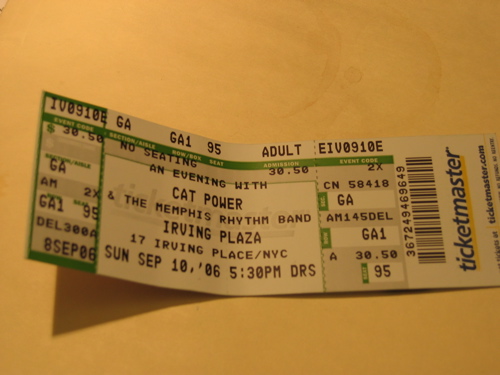
Two things that both Mariah Carey and Cat Power did on stage this year: Wear black Louboutins and cover “Crazy.” *
* Mariah had Trey Lorenz sing it, but still.
BIG BLACK, TOUCH & GO 25TH ANNIVERSARY SHOW
I was in a band from 1986 to 1991 called Dolores. When one of our live shows was going particularly well—or particularly badly—we turned to songs written by other people. One was “Hots On For Nowhere” by Led Zeppelin. Another was “Tomorrow Never Knows.” (We recorded a version of that in a stu-stu-studio, so if someone can convert cassettes to MP3, I’ll send you the song and post the digitized file.) The song we played most often in a moment of crisis was Big Black’s “Racer X,” because, as seen above, it sounds pretty great even when the band in question doesn’t remember exactly how it goes.
September 10, 2006
September 07, 2006
September 05, 2006
September 04, 2006
THE NEW OLD DISTINCTIFIED PERFECTIONS
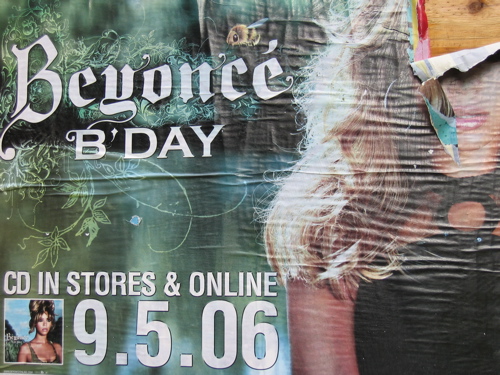
I am into this. On the other hand, if I watch this, I can’t write a check or make a salad for, like, an hour. Therein lies the etc.
September 03, 2006
THE RIGHT TO SPEAK
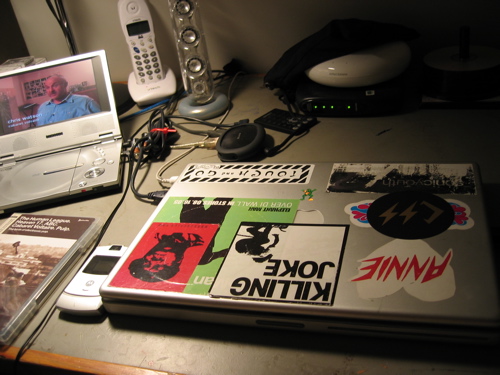
“The right to speak politically, even in the most rudimentary way, that is, by producing a ‘yes’ or ‘no,’ or even putting a cross beside a prefabricated answer, is strictly proportionate to the sense of having the right to speak. Nothing shows this more clearly than the composition of the so-called spontaneous sample of people who responded to a ‘national consultation’ on the educational system, organized, with the aid of the press, after the events of 1968. In so doing they asserted themselves as parties to the debate, entitled to express an authorized, authoritative opinion, to voice the performative utterance of a legitimate pressure group. The opinion mobilized—as if by a petition—about education closely coincides with the population of users of higher education. The probability that an isolated agent, in the absence of any delegation, will form an explicit, coherent opinion on the educational system depends on the extent to which he depends on it for his reproduction and is objectively and subjectively interested in its functioning.”
— Pierre Bourdieu, Distinction, p. 411.
